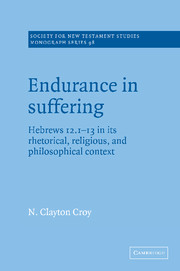Book contents
- Frontmatter
- Contents
- Acknowledgments
- List of Abbreviations
- 1 Introduction, retrospect, and prospect
- 2 Athletes and exemplars
- 3 Punitive and non-punitive suffering
- 4 Endurance in suffering: Interpreting Hebrews 12.1–13
- 5 Summary, conclusions, and theses
- Bibliography
- Index of ancient texts
- Index of topics
- Society for New Testament Studies MONOGRAPH SERIES
3 - Punitive and non-punitive suffering
Published online by Cambridge University Press: 10 November 2009
- Frontmatter
- Contents
- Acknowledgments
- List of Abbreviations
- 1 Introduction, retrospect, and prospect
- 2 Athletes and exemplars
- 3 Punitive and non-punitive suffering
- 4 Endurance in suffering: Interpreting Hebrews 12.1–13
- 5 Summary, conclusions, and theses
- Bibliography
- Index of ancient texts
- Index of topics
- Society for New Testament Studies MONOGRAPH SERIES
Summary
Introduction
The history of research in chapter 1 revealed that παιδεíα and related terms in Hebrews 12.5–11 have been variously understood by different interpreters. ∏αιδεíα can refer to corrective punishment, rigorous training, or the end result of training, i.e., education or culture. The nuances of the English word “discipline” approximate this range of meanings. I suggested that a useful way to frame the investigation of the background of Hebrews 12.5–11 was the antithesis of punitive versus non-punitive discipline. The former presupposes wrongdoing on the part of the sufferers and construes their suffering as divine punishment for those misdeeds. The latter makes no such assumption; it disavows a necessary connection between suffering and sin. In addition, non-punitive interpretations often attribute a positive benefit to suffering, a kind of formative experience whereby the sufferers advance in virtue, righteousness, etc. Punitive discipline may, of course, also result in learning or personal formation. Punitive discipline and formative discipline are not mutually exclusive categories. But by framing the investigation in terms of punitive and non-punitive discipline, we obviously do have mutually exclusive categories. The distinguishing factor then is not whether learning results, but whether wrongdoing is presupposed. When learning does result, its precise nature may also help distinguish between punitive and non-punitive discipline. The former produces a chastened spirit, an eagerness to avoid further error; the latter produces a mature, hardy spirit, a toughness and endurance.
- Type
- Chapter
- Information
- Endurance in SufferingHebrews 12:1-13 in its Rhetorical, Religious, and Philosophical Context, pp. 77 - 161Publisher: Cambridge University PressPrint publication year: 1998

